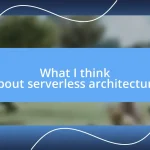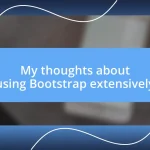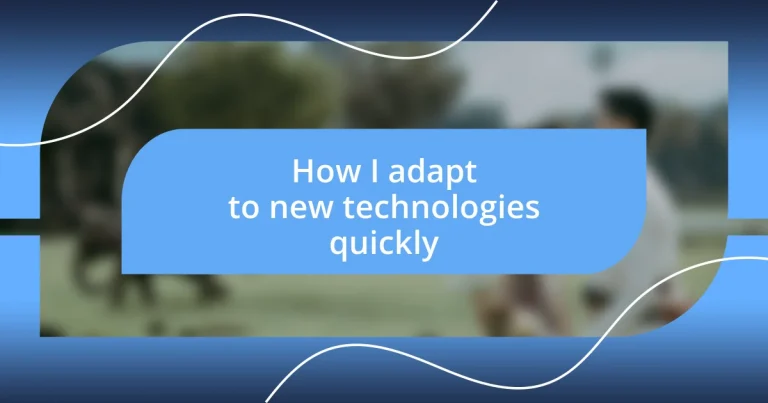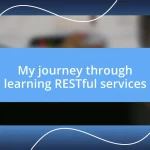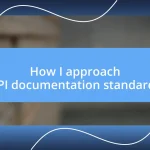Key takeaways:
- Diving deep into various resources, such as online courses, forums, and tutorials, enhances understanding of new technology trends.
- Setting achievable goals and measuring progress through small milestones fosters motivation and engagement in learning new technologies.
- Utilizing online communities for support, feedback, and networking can significantly accelerate the learning process and provide valuable insights.
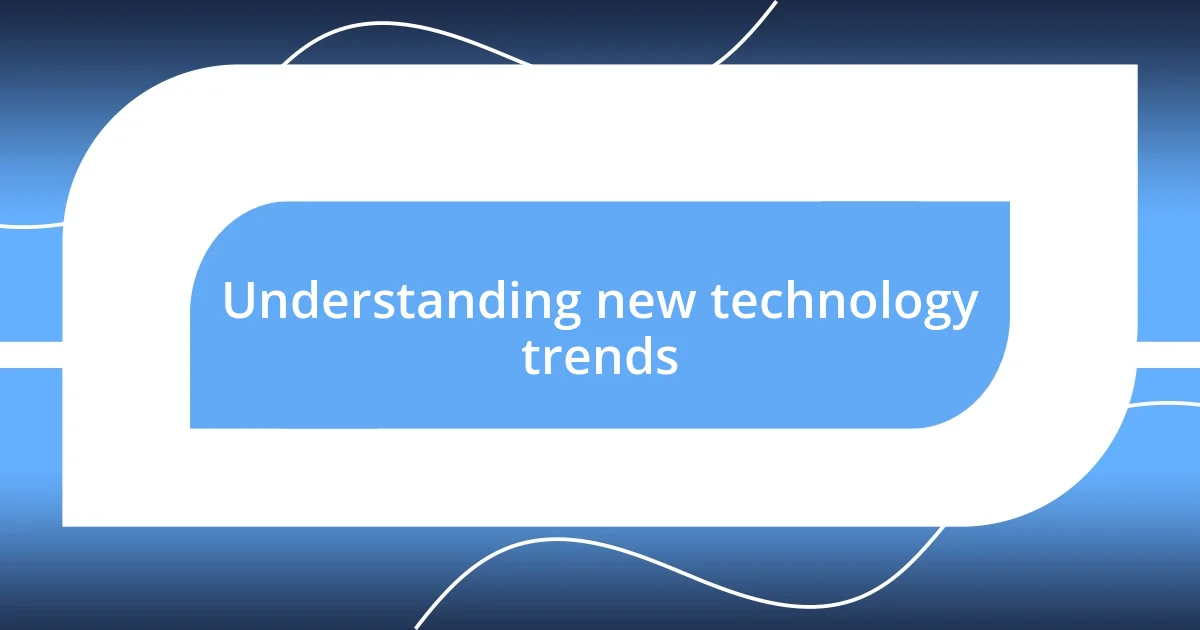
Understanding new technology trends
Understanding new technology trends requires more than just skimming headlines. I often find myself diving deep into articles, reviews, and forums, soaking up insights from various perspectives. Isn’t it fascinating how each trend transforms the landscape of our daily lives in unexpected ways?
I remember when cloud computing started to gain traction. At first, it felt overwhelming, with so many options and jargon flying around. But by immersing myself in user experiences and industry case studies, I began to appreciate the simplicity and efficiency it brought. Have you ever taken a moment to reflect on how a new technology changed your routine for the better?
Trends often reveal themselves through patterns, and I’ve learned to spot hints of what’s coming next by following thought leaders and attending tech meetups. For instance, the rise of artificial intelligence seemed gradual, but once I connected the dots from various sources, it all started making sense. How do you keep your finger on the pulse of technological change? It sure helps to share insights with like-minded enthusiasts!
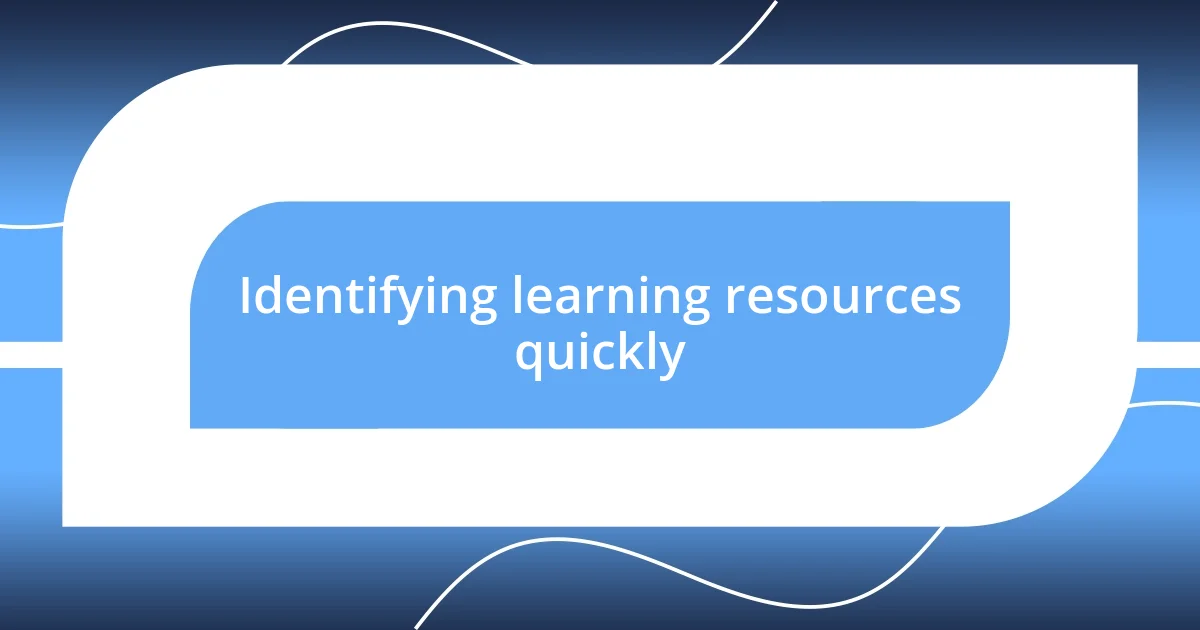
Identifying learning resources quickly
Identifying learning resources quickly is essential when new technology emerges. I tap into a variety of platforms, which I find particularly helpful. My go-to places often include:
- Online courses: Websites like Coursera and Udemy are fabulous for structured learning.
- YouTube tutorials: I love finding visual content that breaks down complex topics.
- Tech blogs and reviews: Following trusted sources keeps my insights fresh.
- Community forums: Reddit and Stack Overflow provide real-world problem-solving tips.
- Podcasts: Listening to industry experts while commuting has become a favorite pastime.
In my experience, using a combination of these resources accelerates my understanding. When the latest smartphone hit the market, I felt overwhelmed by the features. Instead of drowning in manuals, I quickly turned to YouTube for hands-on demonstrations and found that the visual explanations resonated with me far more than written guides ever could. It’s amazing how diverse resources can enhance comprehension and efficiency in our learning journey!
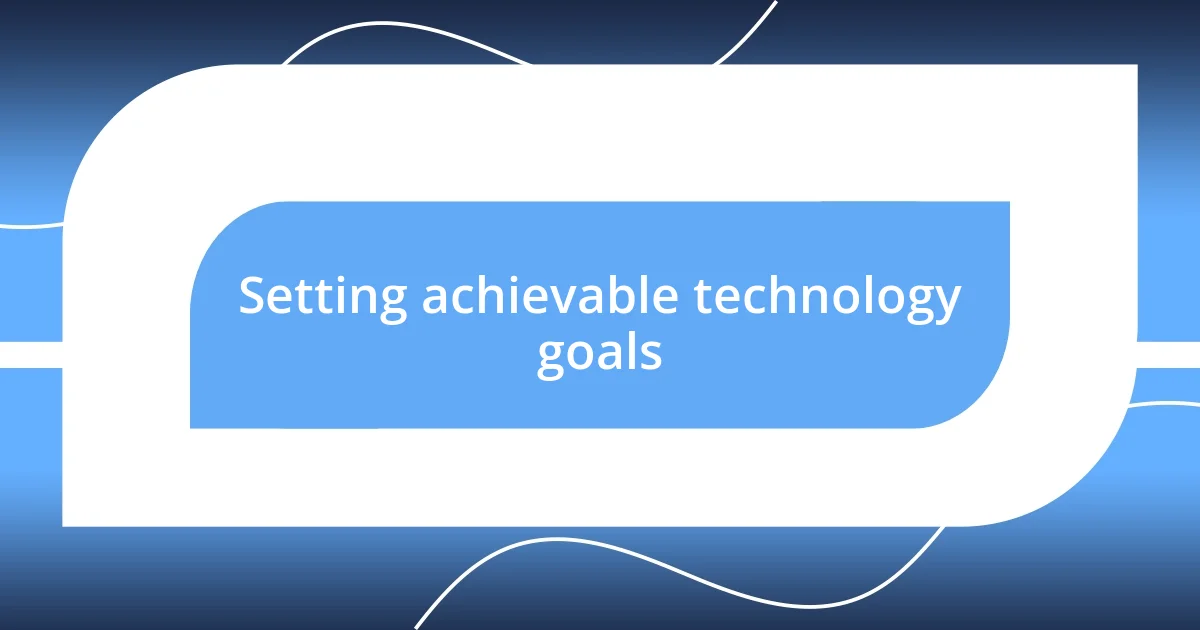
Setting achievable technology goals
Setting achievable technology goals is all about breaking down what might seem like a daunting task into manageable steps. I made a point of learning a new programming language last year, and I didn’t just jump in headfirst. Instead, I set monthly milestones—like mastering the basics in the first month and tackling a small project in the second. This approach kept me motivated and made the process feel less overwhelming. How do you structure your learning goals?
Another essential aspect is measuring progress along the way. For instance, when I aimed to become proficient in using new project management software, I frequently checked my understanding through practice tests and practical applications. Each completed task or lifted hurdle made me more confident. I believe celebrating these small wins adds a fun element to the learning journey—do you find that acknowledging progress helps you stay focused?
Ultimately, I find that aligning my technology goals with personal interests fosters genuine engagement. When I decided to learn about cybersecurity, I combined my goal with my passion for online gaming. It turned out to be an exciting way to learn about protecting digital spaces and made studying something I looked forward to rather than a chore. Have you ever blended your interests with your learning goals for more enjoyment?
| Goal Setting | Measurement |
|---|---|
| Break down goals into smaller tasks for better manageability. | Use practical tests to measure understanding and progress. |
| Align technology goals with personal interests for engagement. | Celebrate small wins to maintain motivation. |
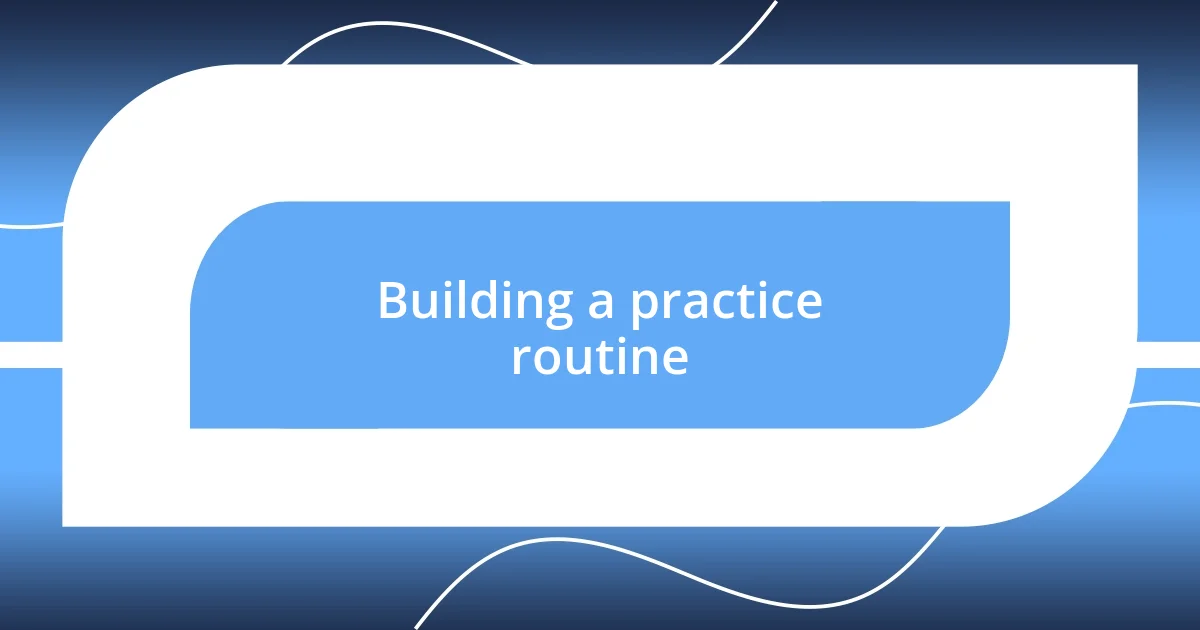
Building a practice routine
Building a practice routine is crucial for mastering new technologies quickly. I remember when I started using a new graphic design software. Initially, I dedicated 30 minutes every day to practice, sketching simple designs. That consistency helped me overcome the initial learning curve and enabled me to create something I was proud of within just a week. Have you ever set aside time regularly for a new skill?
In my experience, integrating specific exercises into my routine has proven effective. For example, while learning to code, I committed to completing one coding challenge a day. This not only solidified my understanding but also made it easier to spot recurring errors in my code. It’s fascinating how small daily practices can lead to significant improvements over time.
Moreover, I find it helpful to mix my practice sessions with creative projects. Once, I decided to build a personal website, which provided an exciting avenue to explore different features and functionalities of a web development tool. This hands-on approach kept me engaged and transformed mundane practice into something meaningful. Have you ever turned your learning into a creative project? It can really amplify your motivation!
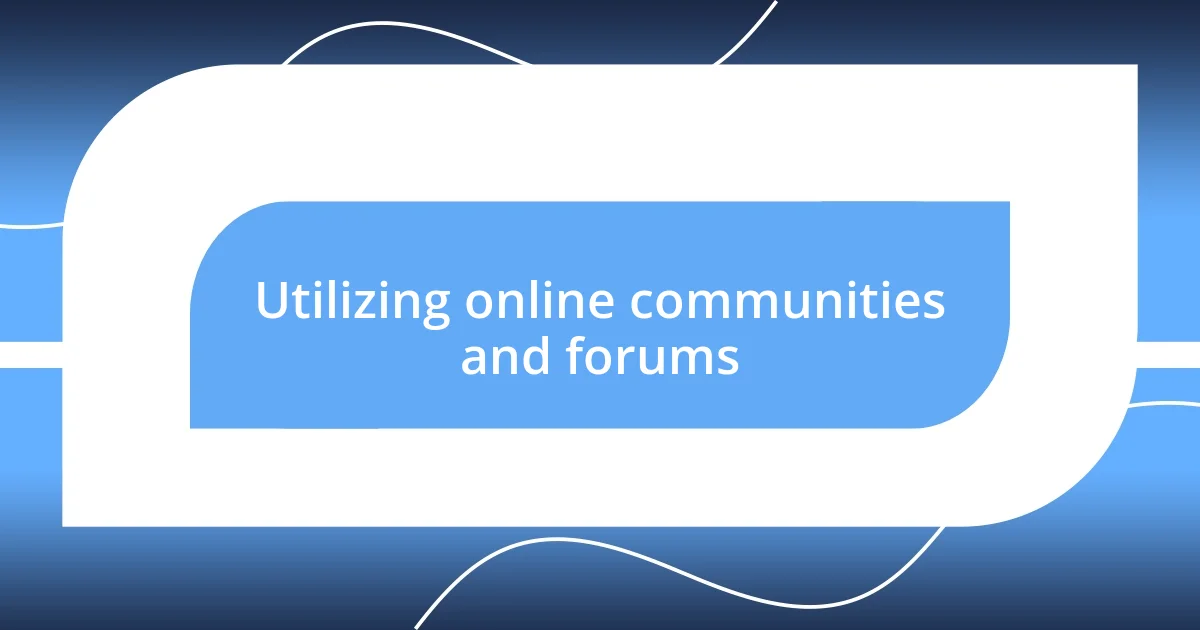
Utilizing online communities and forums
Utilizing online communities and forums can significantly accelerate my learning process with new technologies. Just last month, I stumbled upon a subreddit dedicated to machine learning. I posted a question about an algorithm I was struggling with, and within hours, several community members jumped in with solutions and resources. It hit me how supportive these spaces can be; have you ever received unexpected help from strangers online?
Participating in these forums has also opened up networking opportunities I didn’t anticipate. I remember one time joining a forum focused on app development where I met a mentor. We exchanged ideas, and through our ongoing discussions, I improved not only my coding skills but also gained insights into industry trends. Connecting with like-minded individuals helps me stay motivated, don’t you think it’s incredible how these online communities can forge such powerful bonds?
Finally, I’ve found that sharing my experiences, even my mistakes, creates a collaborative environment. When I shared a project I was proud of on a tech forum, the feedback was both humbling and encouraging. People chimed in with constructive criticism, which I found invaluable. The sense of camaraderie we build in these spaces is palpable, reminding me we’re all in this learning journey together. Have you ever felt that sense of belonging in an online community? It’s empowering!
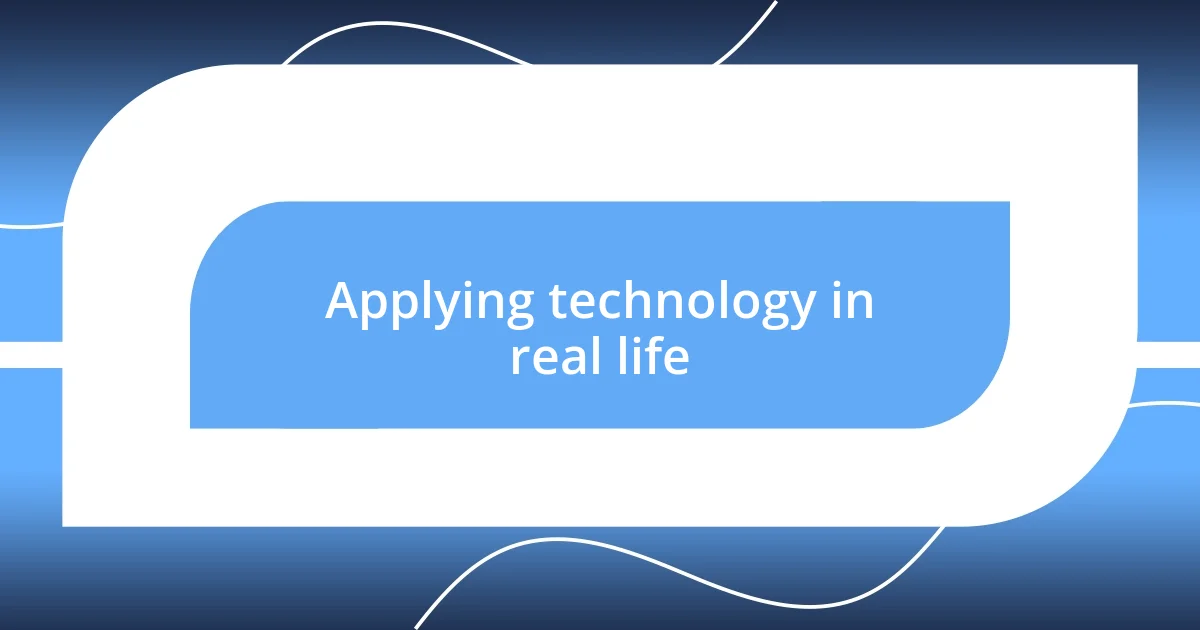
Applying technology in real life
Applying technology effectively in real life isn’t just about knowing how to use it; it’s about finding ways to weave it into my daily life seamlessly. For instance, when I got my first smartwatch, I wasn’t just interested in the fitness tracking features. I used it to manage my daily tasks, setting reminders and checking messages without constantly reaching for my phone. Have you ever noticed how small tech tools can streamline your routine? It’s amazing how a little change can make a big difference!
Moreover, I’ve realized that embracing technology in my personal projects can enhance my experience and productivity. A few months ago, while organizing an event, I utilized an event management app to handle registrations and communicate with participants. This not only saved me hours of work but also made the entire process more interactive. Isn’t it fascinating how these applications can transform even ordinary tasks into organized events?
Lastly, I love experimenting with new technologies in my hobbies. Recently, I dived into home automation systems, aiming to make my living space smarter. It was thrilling to set up voice-activated lights and learn how to control everything from my phone. Each little success fueled my enthusiasm, reminding me of the joy that comes with problem-solving. What’s been your experience with integrating tech into your hobbies? It truly opens up a new world of creativity!
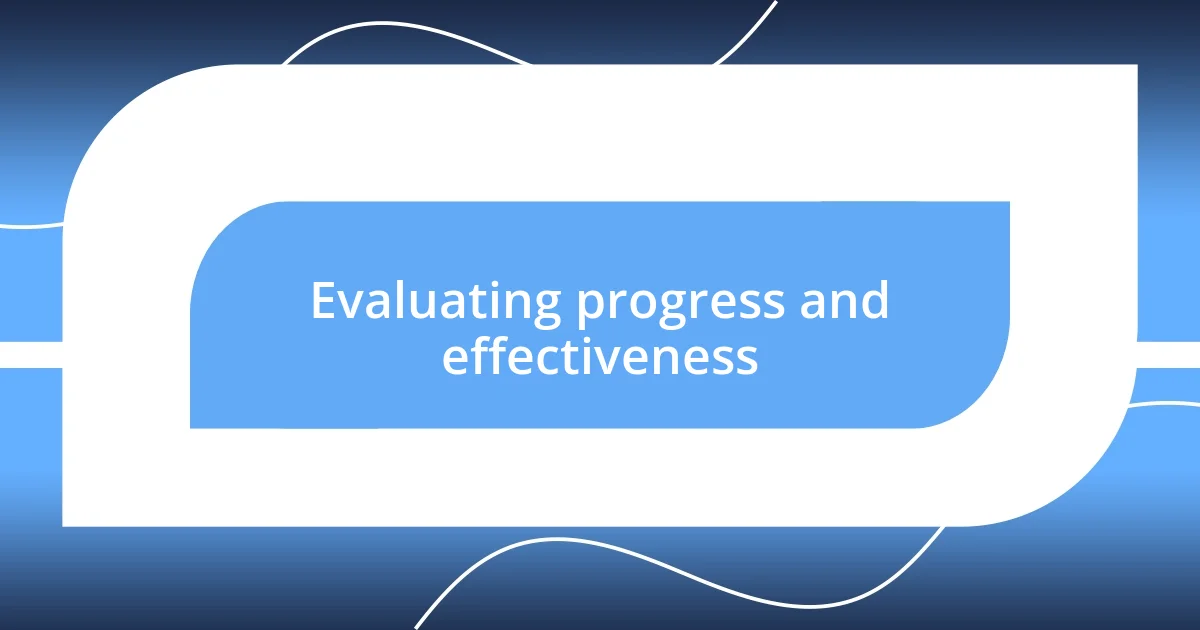
Evaluating progress and effectiveness
Evaluating my progress and effectiveness when adapting to new technologies is a practice I genuinely value. I like to assess my learning through tangible outcomes, whether it’s completing an online course or successfully implementing a new tool in a project. Reflecting on moments of difficulty, I ask myself: “What did I struggle with, and how can I approach it differently next time?” This self-reflection has often led me to breakthroughs in my understanding.
Feedback is another crucial element in my evaluation process. For instance, after implementing a new software feature at work, I sought input from my colleagues to gauge its impact. Their insights were enlightening, revealing areas of success and opportunities for improvement that I hadn’t initially recognized. Have you ever found that external perspectives can shine a light on your blind spots? It’s fascinating how collaborative evaluations foster a continuous learning environment.
Lastly, I find that setting specific benchmarks helps me track my development effectively. I remember setting a goal to learn a new coding language within three months. By regularly checking my progress against that timeline, I was able to adjust my learning strategies as needed. I felt immense satisfaction when I not only met my goal but also built a small project using the new language. Isn’t it rewarding to see how far you can go when you have a clear plan and milestones? This reflection not only cements my learning but also motivates me for future challenges.



